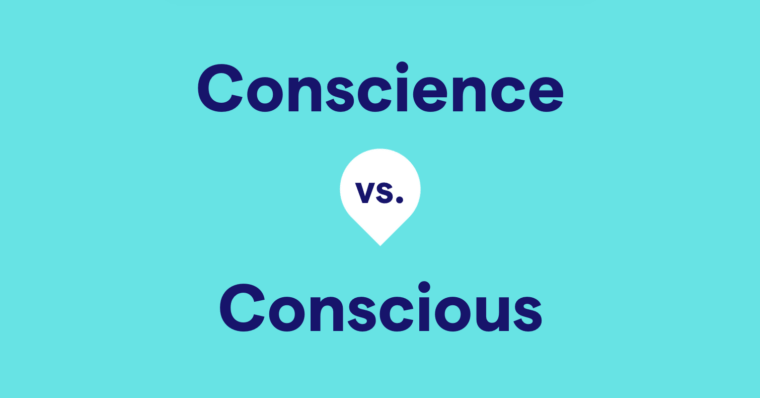
We’ve all been there: You’re in the middle of a conversation when suddenly you say a word, and the person you’re talking to gives you that look—the one that says, “I don’t think that means what you think it means.”
Words like “conscience” and “conscious” are why these moments exist. They’re similar-sounding words that you probably don’t use on a daily basis. However, the meanings of these words are very different. So it’s important to know how to correctly use each word, especially if you plan on using one of these words in a professional setting.
Here’s everything you need to know so you’ll never mix up “conscience” and “conscious” again.
Conscience vs. conscious: Definitions
The definitions are not the only notable differences between these words.
Conscience
- Definition: An inner sense of right and wrong about your actions.
- Spelling: conscience
- Part of speech: noun
- Pronunciation: con-shence
Conscious
- Definition: Awake or aware of your surroundings and responsive to them.
- Spelling: conscious
- Part of speech: adjective
- Pronunciation: con-shuss
The context in which these words are used can also change their meanings. In fact, there are specific definitions for these two similar-sounding words in medical settings:
- Conscience (in psychoanalysis): A part of the superego that gives orders and warnings to the ego.
- Conscious: Having all of your mental faculties.
You should also remember that variations of these words can create different meanings. For example, “conscious” simply indicates that a person is awake and alert, but “self-conscious” means that someone is especially aware of their self, actions, or body.
Clearly, “conscience” and “conscious” have very different definitions, but if you’ve ever mixed them up, you aren’t alone. Their similar pronunciations (which both start with the sound “con-sh”) and spellings (they both begin with the letters “consci”) make them easy to confuse. That’s why it’s always worth spell-checking and proofreading your writing before sending it to anyone, especially if you’re using one of these words.
When to use each word
The different definitions for these two words mean that you can’t use them interchangeably. Here’s when to use each word:
When to use “conscience”
Generally, if you’re talking about an internal moral compass (a person’s sense of right and wrong), you’d use the word “conscience.” You can also describe a negative state of someone’s conscience, as in a “guilty conscience.” There is also a variation of this word, “conscientious,” which is an adjective that refers to a person’s desire to do the right thing.
When to use “conscious”
If you’re talking (or writing) about the state of being awake or alert, you’d choose the word “conscious.” It can also be used to describe a person or groups who are particularly aware of a specific thing. For example, those who are frugal might be called “cost-conscious.”
Conscience vs. conscious examples
Conscience
- I want to say no, but my conscience tells me I must say yes.
- His conscience would not allow him to stay silent.
- Sometimes, your conscience requires you to take action.
- A guilty conscience can have all sorts of negative consequences.
- There’s no better feeling than having a clear conscience.
Conscious
- She lost consciousness, but a bystander called an ambulance.
- You need to be conscious of the risks when investing in the market.
- The patient was fully conscious and able to articulate what he was doing before the injury.
- Social consciousness can help to create a stronger community.
- Making a conscious effort to spend more time with friends can help strengthen those bonds.
Conscience vs. conscious FAQs
What do conscience and conscious mean?
“Conscience” is an awareness of the morality of your actions (right or wrong). “Conscious,” on the other hand, means that “someone is awake and alert.”
Why are they easily confused?
“Conscience” and “conscious” sound similar when spoken aloud and have the same prefix (“con”), making them easy to confuse.
How can you remember the difference?
The sentence “In science, you can be right or wrong” can help you remember that “conscience” refers to your sense of right and wrong. So if you need to refer to someone being awake, you’d instead use “conscious.”






